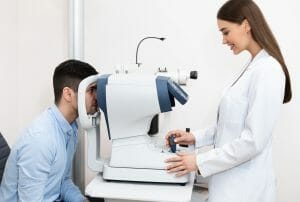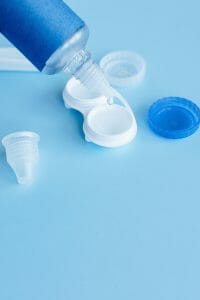Contact lens consumers have to be vigilant about their lenses from buying, wearing to storing in order to prevent infections.
Contact lenses provide an effective and safe alternative to eyeglasses; hence many people have switched to wearing contact lenses. But contact lenses can lead to some serious eye problems if anything goes wrong. Some of these problems can result in permanent loss of eyesight.
Contact lenses are an effective and safe substitute for glasses if handled with care. The infections due to contact lenses include a scarred cornea and a reduction in vision. Even minor damage to the eye can be painful and disrupt your life.
Reports have shown that more than a quarter of the total eye infection cases due to contact lenses are easily avoidable if contacts are handled with more care. For example, wearing them longer than recommended, wearing them to the swimming pool, or wearing them while sleeping.
Experts have emphasized that proper contact lens care is necessary to maintain good eye health. The patients have to treat contact lenses as medical devices that need to be handled with great care.
American Optometric Association (AOA) suggests the following tips for caring for contact lenses and wearing them safely.
Schedule a Visit to Your Optometrist Once in a Year

A yearly in-person eye exam determines if your prescription has changed or not, and it also evaluates your overall health along with the health of your eye. An optometrist can diagnose several diseases like diabetes, glaucoma, neurological issues, color blindness, and peripheral vision issues. Therefore, an annual examination of the eye is also important for early diagnosis of other health issues.
Keep Calm if Your Lens is “lost” in the Eye.
Sometimes, if you rub your eye, the contact lens moves under the eyelid. It is quite rare that it gets lost in the eye because a membrane prevents any foreign object from getting around the eye.
If the lens has moved under the eyelid and is not visible, keep calm and sit back and relax. Put a few drops of saline solution and moisten the eye. Look in the opposite direction from where the lens has disappeared. Lift your eyelid to locate the lens. Remove the lens gently with the tip of your finger.
It is advisable that you rush to your eye doctor if you don’t know what you are doing or don’t feel comfortable taking it out yourself.
Purchase Your Contacts from a Trusted Dealer

Contacts and related products are medical devices regulated and certified by the FDA. However, some retailers sell them without authority, and some online retailers ship contact lenses with wrong prescriptions that can damage your eyes. When buying contact lenses, make sure that you try them once in the presence of an optician and that they fit you perfectly.
Don’t Share Your Contacts with Others.
If you share your contacts, it means that you are sharing your bacteria and germs. It is worse than sharing your toothbrush. It increases the risk of infection and opens gates to many eye complications.
Keep Your Lens Case Disinfected

After wearing your reusable disinfected contact lenses, clean the lens case with the saline solution and place it on a clean, dry surface upside down and let it dry completely from the inside. Replace your lens case every three months.
Never Let Tap Water Come in Contact With the Lenses
Lens solutions remove secretions, mucus, deposits, or films that can build up on the lens and lead to bacterial growth if not rinsed properly. Use the disinfection solution only to clean the lenses. No other liquid like your saliva, eye drops, or water can be used to disinfect the lenses.
Do Not Sleep in Your Contacts
Sleeping while wearing contacts is one of the usual causes of eye infection due to contact lenses. It is important that you take them off a couple of hours before falling asleep to let your eyes breathe freely.
However, there are some lenses that need to be worn during sleep, but they are to be used strictly on the recommendation of the doctor.
Replace Your Lenses Before the Recommended Dates
According to a report, more than half of the lens wearers admitted to having worn disposable contacts longer than their suggested duration. It can cause serious eye damage due to oxygen deprivation and bacterial infection.


